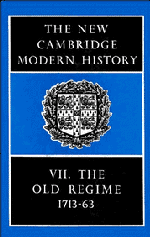Book contents
- Frontmatter
- CHAPTER I INTRODUCTORY SUMMARY
- CHAPTER II THE GROWTH OF OVERSEAS COMMERCE AND EUROPEAN MANUFACTURE
- CHAPTER III THE SOCIAL CLASSES AND THE FOUNDATIONS OF THE STATES
- CHAPTER IV THE VISUAL ARTS AND IMAGINATIVE LITERATURE
- CHAPTER V THE ENLIGHTENMENT
- CHAPTER VI RELIGION
- CHAPTER VII MONARCHY AND ADMINISTRATION
- CHAPTER VIII THE ARMED FORCES AND THE ART OF WAR
- CHAPTER IX INTERNATIONAL RELATIONS
- CHAPTER X THE DECLINE OF DIVINE-RIGHT MONARCHY IN FRANCE
- CHAPTER XI ENGLAND
- CHAPTER XII THE WESTERN MEDITERRANEAN AND ITALY
- CHAPTER XIII THE ORGANISATION AND RISE OF PRUSSIA
- CHAPTER XIV RUSSIA
- CHAPTER XV SCANDINAVIA AND THE BALTIC
- CHAPTER XVI POLAND UNDER THE SAXON KINGS
- CHAPTER XVII THE HABSBURG DOMINIONS
- CHAPTER XVIII THE WAR OF THE AUSTRIAN SUCCESSION
- CHAPTER XIX THE DIPLOMATIC REVOLUTION
- CHAPTER XX THE SEVEN YEARS WAR
- CHAPTER XXI THE DEVELOPMENT OF THE AMERICAN COMMUNITIES
- CHAPTER XXII RIVALRIES IN AMERICA
- CHAPTER XXIII RIVALRIES IN INDIA
- CHAPTER XXIV ECONOMIC RELATIONS IN AFRICA AND THE FAR EAST
- References
CHAPTER XXIII - RIVALRIES IN INDIA
Published online by Cambridge University Press: 28 March 2008
- Frontmatter
- CHAPTER I INTRODUCTORY SUMMARY
- CHAPTER II THE GROWTH OF OVERSEAS COMMERCE AND EUROPEAN MANUFACTURE
- CHAPTER III THE SOCIAL CLASSES AND THE FOUNDATIONS OF THE STATES
- CHAPTER IV THE VISUAL ARTS AND IMAGINATIVE LITERATURE
- CHAPTER V THE ENLIGHTENMENT
- CHAPTER VI RELIGION
- CHAPTER VII MONARCHY AND ADMINISTRATION
- CHAPTER VIII THE ARMED FORCES AND THE ART OF WAR
- CHAPTER IX INTERNATIONAL RELATIONS
- CHAPTER X THE DECLINE OF DIVINE-RIGHT MONARCHY IN FRANCE
- CHAPTER XI ENGLAND
- CHAPTER XII THE WESTERN MEDITERRANEAN AND ITALY
- CHAPTER XIII THE ORGANISATION AND RISE OF PRUSSIA
- CHAPTER XIV RUSSIA
- CHAPTER XV SCANDINAVIA AND THE BALTIC
- CHAPTER XVI POLAND UNDER THE SAXON KINGS
- CHAPTER XVII THE HABSBURG DOMINIONS
- CHAPTER XVIII THE WAR OF THE AUSTRIAN SUCCESSION
- CHAPTER XIX THE DIPLOMATIC REVOLUTION
- CHAPTER XX THE SEVEN YEARS WAR
- CHAPTER XXI THE DEVELOPMENT OF THE AMERICAN COMMUNITIES
- CHAPTER XXII RIVALRIES IN AMERICA
- CHAPTER XXIII RIVALRIES IN INDIA
- CHAPTER XXIV ECONOMIC RELATIONS IN AFRICA AND THE FAR EAST
- References
Summary
The period between the death of Aurangzeb in 1707 and the end of the Seven Years War in 1763 witnessed the decline of Muslim rule in India and the growth of semi-independent ‘country powers’ owing little more than a vague allegiance to the enfeebled descendants of the Great Moguls at Delhi. The resultant anarchy enabled the French and English trading companies to intervene in Indian affairs. Their struggles for commercial and territorial supremacy ended in the victories of Clive by means of which the French were ousted from the Carnatic and the English East India Company became the de facto ruler of Bengal. It would, however, be incorrect to suppose that the disintegration of the Mogul Empire began with the death of Aurangzeb, for the anarchy that ensued was merely the acceleration of a decline that had been taking place for at least half a century. This cannot be fully appreciated without some knowledge of Akbar's policy.
The wise and necessary policy of the great Mogul Emperor Akbar was reversed by his immediate successors, Jahangir, Shah Jahan and Aurangzeb. He had deliberately accepted compromise as the basis of his empire, and by his policy of sulh-i-kull (universal toleration) and his abolition of the jizya, the detested poll-tax on non-Muslims, he had striven to conciliate the subject Hindu population and to secure their loyalty to his rule. It was his successors' gradual departure from the main principles of his rule, culminating in the religious and political intolerance of Aurangzeb, that eventually produced a far-reaching Hindu reaction and provoked the Marathas of the Deccan and the Rajputs, Jats and Sikhs of northern India to raise the standard of revolt, from the Maratha principality of Tanjore in the south to the plains of the Panjab in the distant north.
- Type
- Chapter
- Information
- The New Cambridge Modern History , pp. 541 - 565Publisher: Cambridge University PressPrint publication year: 1957



